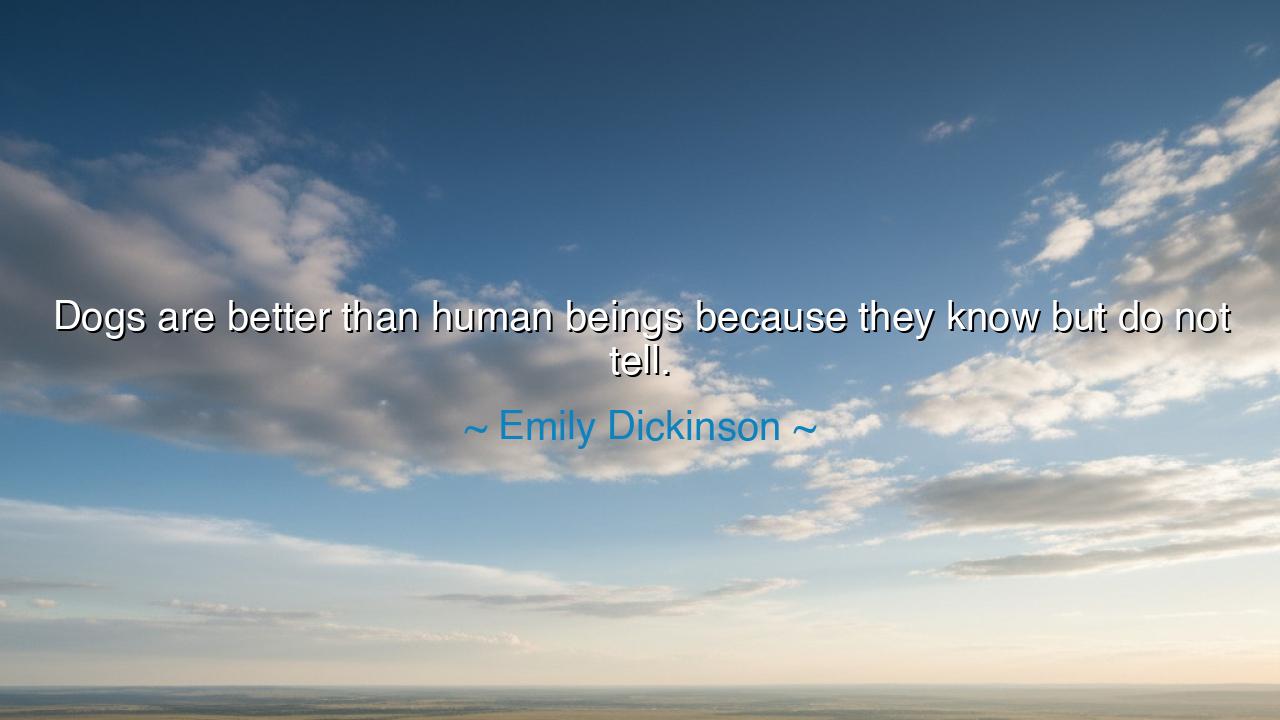
Dogs are better than human beings because they know but do not






Emily Dickinson, that quiet priestess of solitude, once uttered the piercing truth: “Dogs are better than human beings because they know but do not tell.” In this simple sentence lies a deep well of wisdom, born from a life of withdrawal and observation. For Dickinson, who dwelt more often in her chamber than in the crowded marketplace, the dog was not merely an animal, but a symbol of trust, loyalty, and silence. Where humans betray with tongues, dogs remain steadfast in wordless fidelity. Where men scatter secrets like dust in the wind, dogs guard them as though they were their own heartbeat.
To say that dogs know but do not tell is to praise their profound discretion. The dog observes every habit, every sorrow, every weakness of its master. It sees the tears shed in the night, the trembling of hands in despair, the fragile moments hidden from the world. Yet never does it betray. Its gaze is gentle, its silence unbroken. In this, Dickinson contrasts it with humankind, whose words often wound more deeply than swords. She reminds us that the noblest companions are those who witness our frailties, yet hold them in sacred trust.
History offers us examples of this truth. Consider the tale of Hachikō, the faithful Akita of Japan. Day after day, he waited at the train station for his master, even after the man had died. Hachikō knew his master would never return, yet he did not reveal despair in words, nor scatter grief in complaint. His silence became a monument of loyalty, greater than the speeches of kings. He carried knowledge in his heart, but he told nothing, and in that silence, he became immortal in the memory of men.
How different, Dickinson would say, are human beings. From the courts of emperors to the gossip of village markets, words are used not to protect but to expose, not to heal but to wound. Betrayal has toppled kingdoms; whispered secrets have ignited wars. Judas, with but a kiss and a few words, sold his teacher for silver. Brutus, with hidden knowledge, struck down Caesar. In such betrayals, the human tongue proves both dagger and poison. Against this backdrop, the dog’s mute loyalty shines all the brighter.
And yet, Dickinson’s quote is not merely about animals; it is a teaching about virtue. She calls us to imitate the dog’s silence, to be guardians rather than betrayers of the secrets entrusted to us. To “know but not tell” is to practice compassion, to hold another’s vulnerability as sacred, to shield rather than expose. In a world where words often enslave or destroy, silence can be an act of love.
The lesson, then, is clear: we must strive to be like the dog in loyalty and discretion. When a friend shares their burden, do not scatter it like grain before the crowd. When you witness another’s weakness, do not strike with mockery or gossip. Instead, hold silence as a shield. Know—but do not tell. For in this restraint lies strength, and in this loyalty lies love.
Practically, this means we must master the tongue. Before speaking of another, ask: does this word protect, or does it expose? Does it build, or does it betray? If it harms, let it remain unspoken. Cultivate trust, so that others may feel safe in your presence, as they feel safe beside their loyal dog. Be the friend who guards, not the one who reveals; the companion who comforts, not the one who wounds.
So remember Dickinson’s wisdom: “Dogs are better than human beings because they know but do not tell.” Let it be a mirror for your own conduct. Speak less, guard more, love fiercely, and let your silence be as noble as the gaze of a faithful hound. In this way, you will become not lesser than the dog, but equal to its greatness—and perhaps, in due time, greater than the human tongue that so often betrays.






AAdministratorAdministrator
Welcome, honored guests. Please leave a comment, we will respond soon